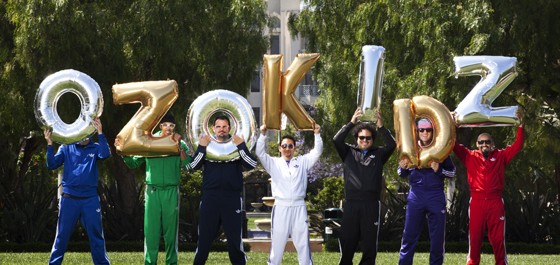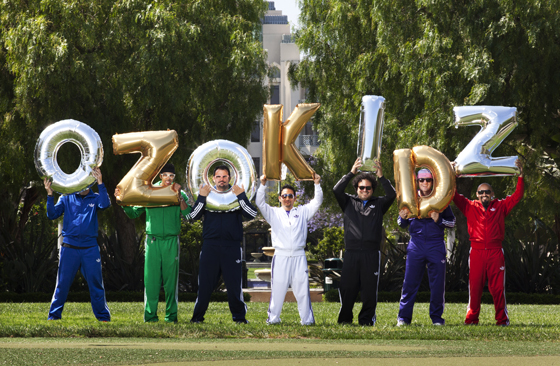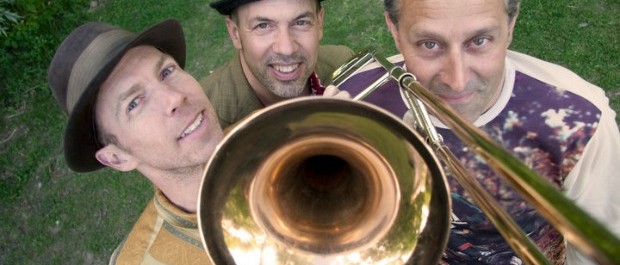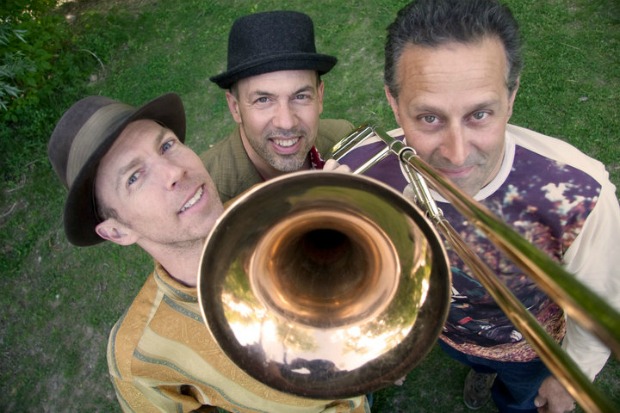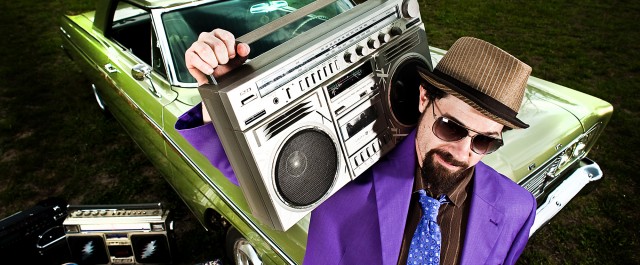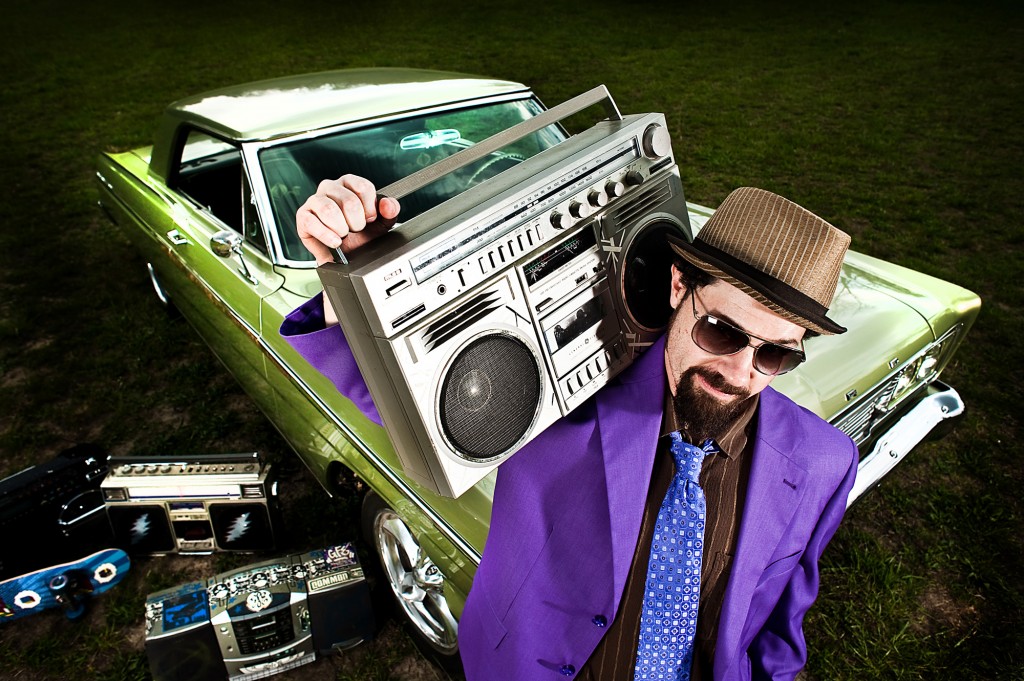After 15 years of enjoying a devoted following, Ozomatli knew it was time for a change when they couldn’t give away tickets to some of their fans. But they could to their kids.
On September 25th, the Grammy-winning band will release its first full length kids album, OzoKidz. This follows a few years of dabbling in side projects such as recording for PBS Kids and the Happy Feet II soundtrack.
I spoke with Ozomatli percussionist Jiro Yamaguchi about his kids musical inspiration, the similarities between playing for kids and adults, and why it’s necessary for them to diversify their sound.
Why a kids album? Why now?
We decided to start doing kids shows at first because we realized that a lot of our fans were having kids. We would do a show on a Wednesday night, and normally in the past we could pack a house. Four years ago and were noticing that people weren’t coming. We put a message out there on Facebook to have an unlimited guest list, and we got responses that we’d get was “We can’t, we have kids.” So a light bulb went off, we were getting older and our fans were too. They were having kids and needed sitters. We just started adapting our old music for children. That’s kind of how it started. And then coincidentally we got these recording gigs for PBS Kids were they wanted us to do 30 second bumper music with a theme — one was on opposable thumbs, one were for mesasurement. Several of those. They made videos with them. And then we had the opportunity to do the entire music for the Happy Feet II video game. They approached us and gave us a list of 30 different songs, everything from “Funkytown” to Harry Belafonte. We went into the studio and did it and it was great. It kind of developed our chops for recording kids music. It was really freeing and it was a lot of fun. So the next steop was to make our own record.
Before you dove head first into Ozokids, did you realize there was sort of a independent cool kids music scene?
I have a duaghter who is 4 now, so I’ve been aware of it, but even before that I had heard of people like Dan Zanes and They Might Be Giants. I became more aware of it once I had my own daughter. I think we’re going to fit right in with that team and offer something a little bit different as well.
Who are some of the artists you looked towards for inspiration?
They Might Be Giants stuff was really inspiring to me. I could listen to it myself and enjoy it as well as my daughter, and that kind of helped me. There was other kids music, and I would say, really, do we have to listen to this? It was not relatable to me. I was like, Oh we need to make music that transcends age — from something really young to adults can listen to. I think our music does anyway. Even if we’re not doing kids music per say, I think it’s broad appeal.
What was the music/band/artist that inspired you to pick up an instrument as a child? Is that your hope with this record, inspiring children to pick up instruments?
I listened to a lot of different stuff from classic rock to punk to jazz. Some of the jazz I listened to as a teenager was mind opening and broadening. It’s kind of like an education without going to school. Later percusionist Zakir Hussain and Prithiraj Chowdhury inspired me to go back to school and study Indian drumming and world music drumming and percussion. I don’t know if our intention was necessarily to get kids to pick up an instrument, but if that’s something that inspires someone picks up, that a great bonus. There are some kids who always come to our Los Angeles shows with Brazilian hand percussion, using the same model that we use and have an Ozo logo on it. It’s kind of cool to see children pick up those things. They are looking at us and saying, let me try that. If that can lead something — music or not — that’s great.
Is there a formula or process to take your sound and make it for kids?
We have a little more freedom when making for kids. There’s a certain amount of freedom to do songs we wouldn’t with Ozomatli. It’s more of a fun element.
Was the song writing process the same, but just with lyrics for kids?
The process is pretty similar. Everyone brings in their own subject matter and ideas. It’s a pretty easy process in terms of what we want to do. That’s a really great place to be when you’re creating in the studio.
You’re back in the studio recording an adult record. Has it been difficult to change the writing process?
Not at all! We’re in pre-production for an Ozomatli record, and I think it actually helps the creative process because our juices are flowing. When you get back in the studio, it’s not hard to switch gears at all, and if anything it helps to keep grease the wheels.
Do you play songs for your kids first to get approval?
We don’t do it to get approval, and most of the songs we haven’t played live yet. A few of the cuts on the album — like “Sun And Moon” and “Piraña” — we were playing before we were recording. I think we work backwards that way. We make them first, then see what works live. The ones that don’t work as much live fall back, and the ones that do rise to the top. This goes for our Ozomatli records too.
Was there a thought of expanding the 4 60-second songs from PBS kids into full songs?
Those were kind of appetizers and one-offs, but we have played some of them live. We could work them into our live set.
Do you find those songs get more recognition?
It’s hard to tell because we’re such a high-energy band and we just want kids to do something on each song to get moving, so I’m not sure if there is a recognition factor.
Little bit different than an adult crowd, then.
Totally different. Well, but now that I say that, maybe it’s different in that the attention spans are a little bit shorter, but what I did notice is, you know what, this is just little people. But they react in the same way that adults do. Underneath it all it’s all the same thing.
Seem to wrote songs from an educational perspective rather then from the eyes of a child, was that done on purpose?
I think that partly came from the PBS kind of thinking. I think that came fromthe process of writing a song on a theme. We just wanted a balance, we wanted songs that are.
The record industry so much different and less stable than it was when you started, was that a motivating factor in this new evolution?
I think it’s kind of necessary. The more diverse in what we can do, the better it is for our band. Having a whole branch of Ozo kids being a completely seperate entity would be a great thing for us. The more things that we have as a band, the better. Whether that’s making music for movies, commercials, movies, while playing kids shows, all those things combined are good for us and the longevity of our band in the way the music business is right now. We’ve been a band for 18 years, and I think part of that is the reason to adapt and not rely on the industry. When we first started, we recorded on tape and pro-tools were just coming out, there wasn’t anything like a 360 deal, Tower Records was still in business, and we’ve seen a lot of changes. Our ability to diversify and do other things has helped us survive, and we’ll keep doing that.
Listen and download the track ‘Trees’ for free! (only until 9/3)
